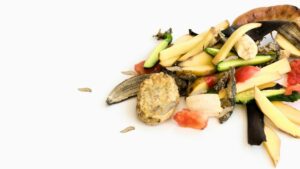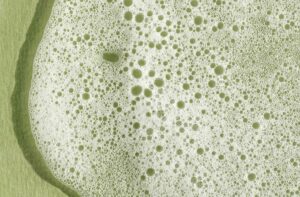Startseite » BIOvative Magazine » That’s what the “Keimling” is all about:
Table of contents
That’s what the “Keimling” is all about:
- 7. September 2023
- Autor: Janine Friebel
- Lesezeit: 9 Minuten
In an ever-growing market of products labeled as “sustainable”, certificates provide security for consumers. The so-called Keimling is one of these certificates that have been introduced throughout Europe so that people like you can be sure that they are holding a truly sustainable product in their hands. The basis for the “Keimling” certificate is DIN EN 13432.

EN 13432: The Keimling at a glance
Core statement of the Keimling
Products with this label are at least 90 percent biodegraded in industrial composting plants within 6 months or 90 percent composted within 3 months. This includes not only the plastic used, but all components of the product. Here we explain the terms “biodegradable” and “compostable” in more detail: “Biodegradable, compostable, biobased, recyclable – meaning and difference”.
The Keimling has these advantages for you
The Keimling
- helps you to recognize the product as compostable
- makes waste separation easier for you, because you know how to dispose of the product
- serves the quality assurance of biodegradable plastics
Requirements to obtain the Keimling
- All ingredients must be traceable.
- Limit values for pollutants are not exceeded.
- The material is 90% biodegraded to carbon dioxide in an aqueous medium within 6 months.
- After 3 months of composting, a maximum of 10 percent of the organic material is left after screening through a sieve with a 2 millimeter opening.
- The material used has no negative influence on the composting process in a composting plant.
- In the process of decomposition, the substance does not emit any toxins that affect plant growth.
Our certificate

Differentiation from other certificates
Other certificates in this area are:
- OK compost INDUSTRIAL
- OK compost HOME
Examples of products with the Keimling
- compostable organic waste bags from BIOvative
- tea filters from ArOmya
- lables from HERMA
EN 13432 in detail - this is what lies behind the Keimling
The Keimling is a trademark that can be awarded to plastics to demonstrate their compostability and biodegradability.
For consumers, the Keimling indicates that the appropriately labeled product will completely decompose in a composting plant within a few weeks.
The Keimling not only indicates that the plastic itself is biodegradable and compostable. The certificate also establishes the corresponding degradability for the components associated with the product, such as labels, inks, adhesives and the like.
The label was created by the European Bioplastics Association.
This association is an association of dealers who sell plastics labeled as compostable and biodegradable. As an association, the traders voluntarily undertake to have their plastics certified with the Keimling in accordance with DIN EN 13432.
The Keimling is used in many countries throughout Europe. You can find the seal, for example, on products in:
- Germany
- Austria
- Switzerland
- Netherlands
- Great Britain
- Poland
What does compostability mean?
Compostability in the sense of the certificate means: In an industrial composting plant with a temperature of about 60 degrees Celsius, the majority of the appropriately labeled product is decomposed to water, carbon dioxide and minerals within 12 weeks. Composting is considered successful when, after screening through a sieve with a 2-millimeter opening, only a maximum of 10 percent of the mass originally put in remains.
Composting is considered the most sustainable way to dispose of waste because it significantly reduces the amount of organic waste. In turn, the resulting compost can be used for raised beds, ornamental plants or horticulture. Why composting is such a great opportunity for environmental protection is also explained in this video:
The requirements behind the "Keimling" certificate
Certification with the Keimling is based on standards that have been harmonized at EU level. This means that the different standards of various member states have been harmonized in their requirements, so that the Keimling can serve as an EU-wide certificate. The corresponding relevant standards are:
- DIN EN 13432
- DIN EN 14995
- or the international ASTMD 6400 standard
For certification, the plastic is first chemically tested:
- Are all ingredients traceable?
- Are limit values for pollutants complied with?
It is then determined whether the material is biologically degraded to carbon dioxide (CO2), among other things, in an aqueous medium, i.e. under the influence of oxygen. This test is considered to be met if at least 90 percent of the organic material has been converted to CO2 within six months.
In addition, it is tested whether the material is disintegrated into compost. For this purpose, a maximum of 10 percent of the original mass may remain after three months of composting, after screening through a 2-millimeter sieve.
In addition, the material is tested for interactions and toxicity. This means the material must not have a negative effect on the composting process itself. Nor should the material release toxins into its environment that could negatively affect plant growth.
For a product to receive the Keimling, it must successfully pass all tests. The tests are based on the scientific definitions for
- aerobic aqueous degradability according to ISO 134511-18452,
- anaerobic aqueous degradability according to ISO 18453
- and aerobic composting according to ISO 18455
This is what distinguishes the Keimling from OK compost INDUSTRIAL and OK compost HOME
The two OK compost certificates differ mainly in their statement about the compostability of a product.
Products with the OK compost INDUSTRIAL certificate
- are guaranteed biodegradable in an industrial composting plant; this applies to all components, colors and additives
- fulfill the requirements of the EN 13432:2000 and the EU-Verpackungsrichtlinie 94162/EG
- can only be composted at temperatures of at least 55°C to 60°C, i.e. only in industrial plants
The OK compost HOME certificate, on the other hand, is not based solely on a standard. Rather, the seal lists all the technical requirements necessary for certification of the product. Products with this seal are generally compostable even at low temperatures, i.e. even on home garden compost.
In Germany, DIN CERTCO also awards the certificate called “DIN-tested garden compostable” for products that can be composted at home.
Products certified with the Keimling at BIOvative
One example of a product that has been certified with the Keimling is our compostable organic bags. The bags are fully compostable and biodegradable. They are also made from renewable, European raw materials – production takes place locally in Germany. All our products proudly carry the Keimling certificate and have also been awarded the OK compost INDUSTRIAL, OK compost HOME and DINplus certificates. What this means for you: With our organic bags, you can easily contribute your share to a more sustainable future.
These articles may also interest you

Maden in der Biotonne: Was tun?
Contents This helps against maggots in the organic waste garbage can The right location for the organic waste garbage can Avoid humidity Keep garbage cans

Echt Nachhaltig: 5 Regeln mit denen Unternehmen Greenwashing vermeiden
Contents How does greenwashing happen? Deliberate greenwashing Greenwashing as a communication trap 5 rules to avoid greenwashing The European Green Deal Advantages of true sustainability

Was ist die Biotonne?
Contents The main facts The collection systems for organic waste What can be put in the organic waste garbage can? Is the organic waste garbage


